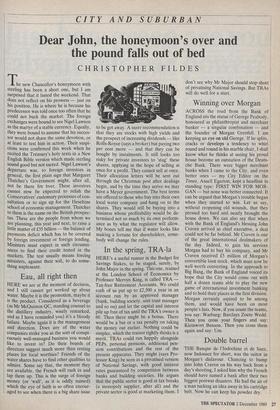Winning over Morgan
ACROSS the road from the Bank of England sits the statue of George Peabody, honoured as philanthropist and merchant banker — a singular combination — and the founder of Morgan Grenfell. I am keeping an eye on old George. If he splits, cracks or develops a tendency to whirl round and round in his marble chair, I shall know what he thinks at seeing his proud house become an outstation of the Deuts- che Bank. There were bigger merchant banks when I came to the City, and even better ones — my City Editor on the Times, Ansel' Egerton, kept a headline in standing type: FIRST WIN FOR MOR- GAN — but none was better connected. It can be argued that Morgan's trouble began when they started to win. Let us say, without reopening old wounds, that they pressed too hard and nearly brought the house down. We can also say that when with the Bank of England's blessing John Craven arrived as chief executive, a deal could not be far behind. Mr Craven is one of the great international dealmakers of the day. Indeed, to gain his services Morgan had to buy his company, and Mr Craven received £5 million of Morgan's convertible loan stock, which must now be well worth converting. In the approach to Big Bang, the Bank of England voiced its hope that the City would come out with half a dozen teams able to play the new game of international investment banking and to hold their places in the first division. Morgan certainly aspired to be among them, and would have been on most people's lists. Now, if you count the teams, you say: Warburg: Barclays Zoete Wedd. Then you cross your fingers and say: Kleinwort Benson. Then you cross them again and say: Urn.










































































 Previous page
Previous page